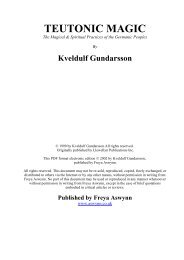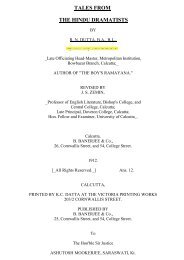Untitled - Awaken Video
Untitled - Awaken Video
Untitled - Awaken Video
You also want an ePaper? Increase the reach of your titles
YUMPU automatically turns print PDFs into web optimized ePapers that Google loves.
Chapter 7. At the Well of Urð 176<br />
individuals, the ancestors, the land and land spirits, and the Gods through acts<br />
based on the spiritual principles of the ancient Germanic peoples.<br />
The purpose of these approaches is to allow the individual to act in such a way as<br />
to be in accordance with the knowledge of the Tree and its currents without actually<br />
having any direct, conscious access to knowledge. Accessing knowledge directly is an<br />
arduous path requiring sacrifices that many are not willing or are unable to make;<br />
this path will be discussed in greater detail below. But, engaging in proper action,<br />
i.e. those actions which are of maximum benefit to all, has the effect of bringing<br />
quality to life. One can eat in a healthy fashion, a take care of the body with<br />
only minimal knowledge of medical or dietary sciences, so it goes with acting in a<br />
spiritual manner to maintain spiritual health.<br />
There are ways to access knowledge, albeit in a slightly indirect fashion through<br />
the use of symbols, without having to engage in years of sacrifice and strenuous<br />
searching: the Germanic forms of divination. There may have originally been many<br />
forms of divination practiced by the ancient Germanic peoples, but only a small<br />
handful have been passed down through the lines of folklore. The main forms of<br />
divination as of the 20th century are omens or “lucky-signs” (ON heill = “omens<br />
of luck”) and the “reconstructed” reading of runes. The third method is not often<br />
thought of as divination but is more a way to “change luck” through minimal action:<br />
hex-signs and songs or charms.<br />
Divination, in the old Germanic sense, is like throwing small objects into the<br />
Well of Urð and watching the patterns that form. Unlike many other forms of<br />
divination in use around the world which purport to read the future, the Germanic<br />
forms read only the present or the past. Anciently, divination was used to glimpse a<br />
situation in a broader scope than what would normally be possible so that changes<br />
could be made as necessary. “Reading-the-future” is inconsistent with the Germanic<br />
worldview. For many of the modern reconstructionists, divination is considered to<br />
be “reading the waters in the Well of Urð” or as it is usually called, the Well of<br />
Wyrd. 6<br />
The Germanic idea of reading omens is a very complex lore involving much time<br />
out in nature. An omen or a lucky-sign is an object, animal, bird, fish or plant<br />
that is situated in a background in such a way that it carries some kind of meaning<br />
for an individual. Modern psychology has been using various oracles for years for<br />
determining the unconscious or subconscious status quo. It is interesting that some<br />
sciences have taken up the use of divination, particularly the I Ching, for the same<br />
reasons that the Germanic peoples did: to read the present.<br />
“But what significance has such ‘fortune telling’ for our own time? Even<br />
those who accept the idea that the I Ching is a storehouse of wisdom will<br />
6 See Edred Thorsson’s At the Well of Wyrd (Samuel Weiser, New York, NY) 1988.
















